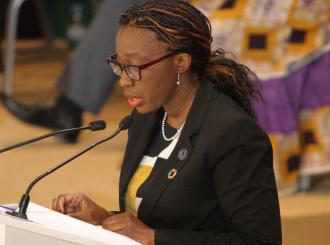
Kigali, 19 March 2018 (ECA) - “At a time when global trading systems seem so uncertain, it is just common sense for us to look at the opportunities closer to home,” said Vera Songwe, Executive Secretary of the UN Economic Commission for Africa (ECA).
She was addressing the 18th Extraordinary Session of the African Union Executive Council on 19 March in Kigali where she underscored that signing and implementing the Continental Free Trade Area (AfCFTA) will protect Africa from growing global economic threats and also ensure that the continent claims its economic importance on the global stage.
The Executive Council is charged with examining draft decisions and declarations on the AfCFTA for submission to heads of state on 21 March for signing.
Africa “will not remain untouched” by the “rising tide of protectionism and anti-globalization” in the developed world, said Ms. Songwe, stating that the US - for example - recently announced increases in steel and aluminum tariffs, which will impact Africa given that the continent currently exports around $800 million in affected steel and aluminum products to the US.
The Executive Secretary also noted that the US has threatened to revoke AGOA preferences for several East African countries, affecting around $450 million, of countries the sub-region do not reverse an industrialization plan to reduce imported second-hand clothing.
These, along with Britain’s decision in 2016 to leave the EU, come as a blow to the confidence in regional integration processes, she said, adding that “the AfCFTA can help Africa weather these challenges.”
For the ECA Chief, AfCFTA is much more than a business opportunity for Africa. It is an opportunity to reverse the trend by which “our youths are left underemployed in jobs that do not make the most of their potentials."
It also promises important benefits for women who constitute over two-thirds of informal cross-border traders on the continent and who “currently face considerable challenges and risks, harassment and abuse,” because they operate principally through informal networks.
“AfCFTA will simplify the cross-border trading regime and create a better trading environment for traders in Africa,” Ms. Songwe noted.
In the same light, AUC Chairperson, Moussa Faki Mahamat, told the Council “we are on the eve of a historic decision. I would like to call upon you to use your intelligence and mobilize all your political and diplomatic resources” to bring the AfCFTA to fruition.
For her part, Rwanda’s minister of foreign affairs, Louise Mushikiwabo, who chairs the Council emphasized on the importance for member states to act now on the AfCFTA as it will “will arm us to improve our social structures and improve the livelihood of all our people.”
In concluding, Ms. Songwe lauded members of the Council; the AU Commissioner of Trade and Industry; and other stakeholders for their “profound demonstration of commitment” to the AfCFTA.
“It tells the world that where their faith is wavering, Africa has not lost its own faith in regional integration and the future of our continent,” she said.
Ms. Songwe cautioned, however, that beyond the laudable progress made thus far, there are critical steps ahead.
“We must develop the national schedules for tariff reduction in trade in goods and for priority services; complete the annex on rules of origin; but above all, we must ensure that the agreement is ratified through our respective national processes.”
She assured the Council of ECA’s readiness to continue to provide all the necessary support for African governments to make the AfCFTA a reality, adding “this is the way forward If we want to industrialize, diversify, and create the needed jobs for our young population.”
In a tone of optimism, Ms. Songwe stated, “As Martin Luther King once said, we are not makers of history, we are made by history. And I hope that this week in Kigali our continent continues to be made by history and that its history becomes even better as we work hard to sign the AfCFTA.”
Issued by:
Communications Section
Economic Commission for Africa
PO Box 3001
Addis Ababa
Ethiopia
Tel: +251 11 551 5826
E-mail: eca-info@un.org